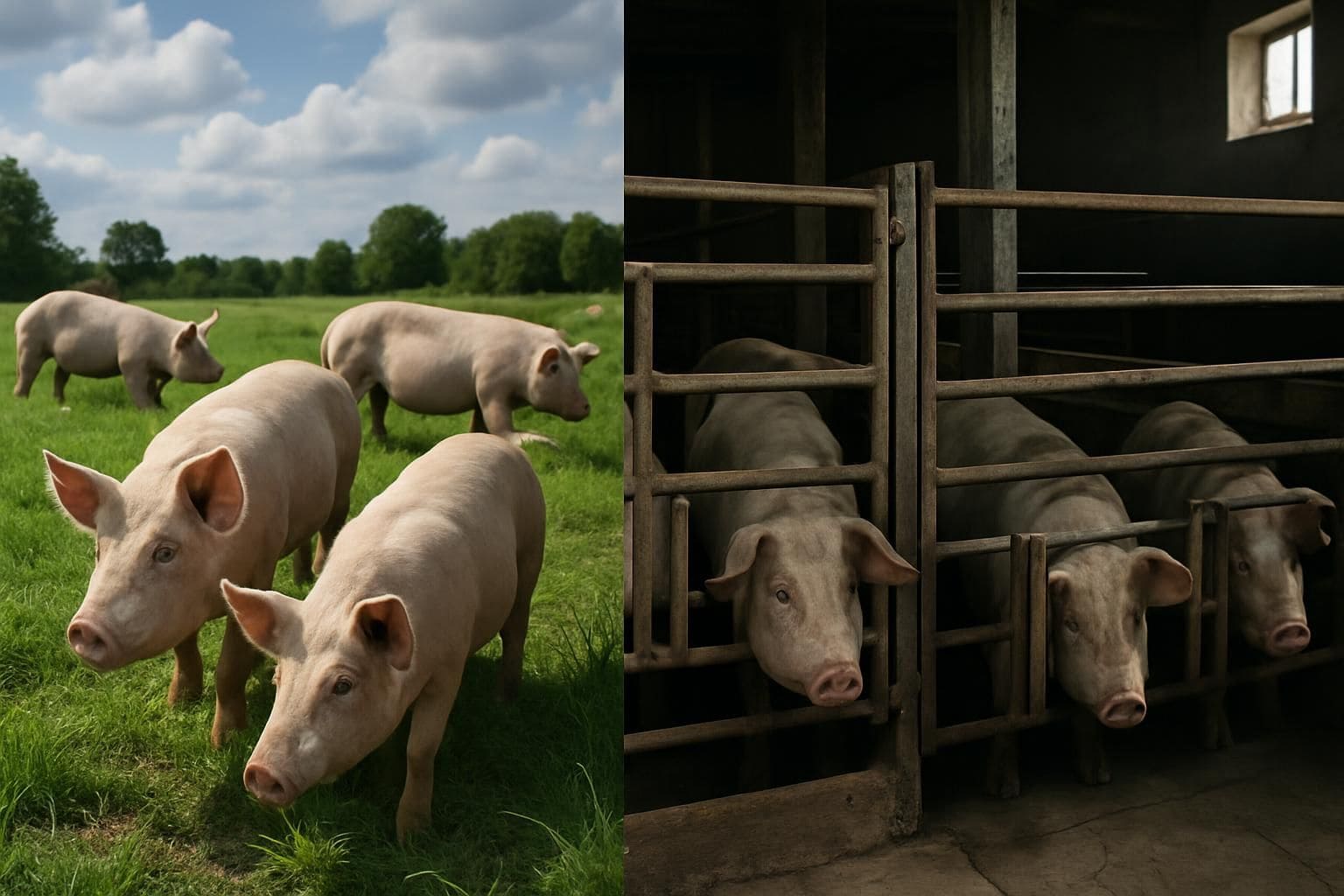Are you unsure about the differences in pasture raised pork vs conventional and which is better for your family’s meals? Pastured pork has richer flavor and healthier fats than meat produced by intensive farming.
In this post, you’ll see how nutritional value, animal welfare, and environmental impacts compare between these two methods. Read on to make smarter food choices!
Key Takeaways
Pasture-raised pork offers more vitamin D, B vitamins, and essential minerals, since pigs roam outdoors and eat naturally.
Research shows pigs raised outdoors have higher omega-3 fats and lower saturated fat, helping your body fight inflammation better.
Factory-raised pigs are often kept cramped in tight pens called gestation crates—but pasture pigs wander freely, which reduces stress, improving the taste and quality of the meat.
Pasture farms naturally spread manure over fields, boosting soil health and avoiding pollution issues common at factory farms.
Industry experts forecast pasture pork sales to rise 30% by 2025, as new tech makes animal health tracking easier and helps lower antibiotic dependency.
Table of Contents
Nutritional Differences
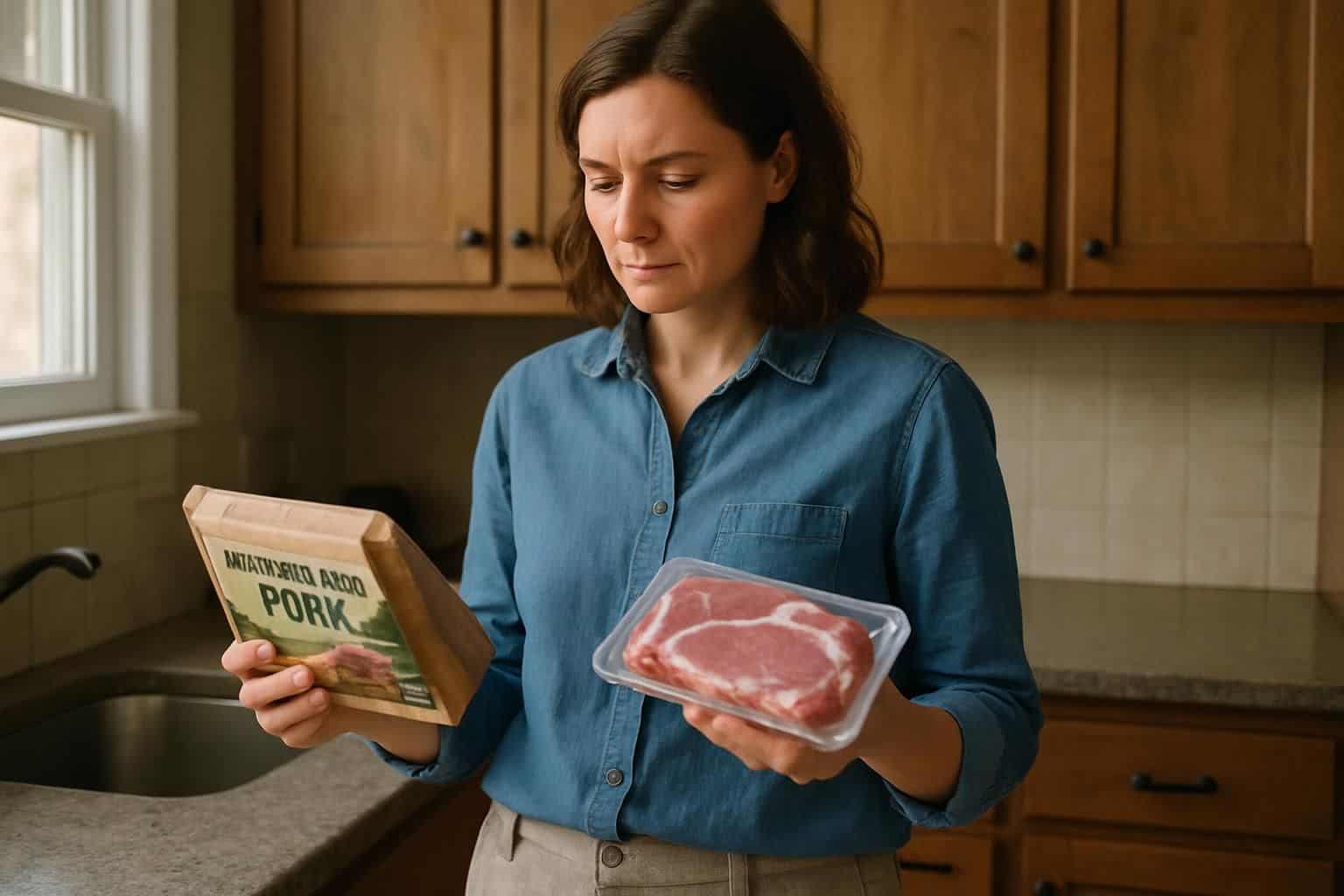
Pasture-raised pork has more vitamins and better fats than factory-farmed meat. The pigs’ natural diet and extra exercise create meat with higher omega-3s and less harmful fat.
Vitamins and Minerals
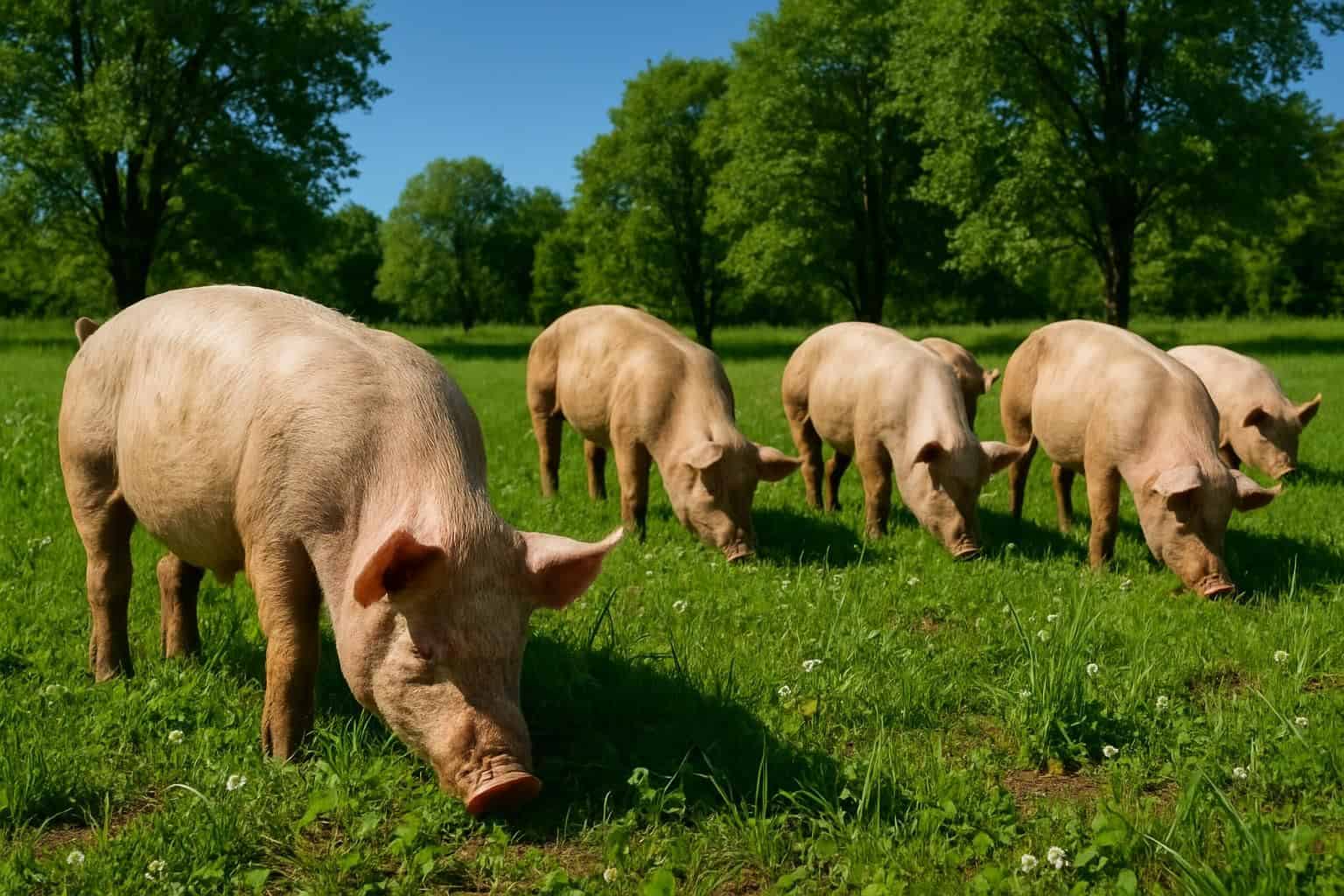
Every day, pigs raised on pasture soak in sunlight, naturally boosting their vitamin D levels. You can clearly notice this difference in the pork you consume. The study “Sun Exposure in Pigs Increases the Vitamin D Nutritional Quality of Pork” supports these findings.
I’ve even seen for myself the marked improvement in flavor and quality while cooking with pastured pork for sale, compared to typical supermarket meats.
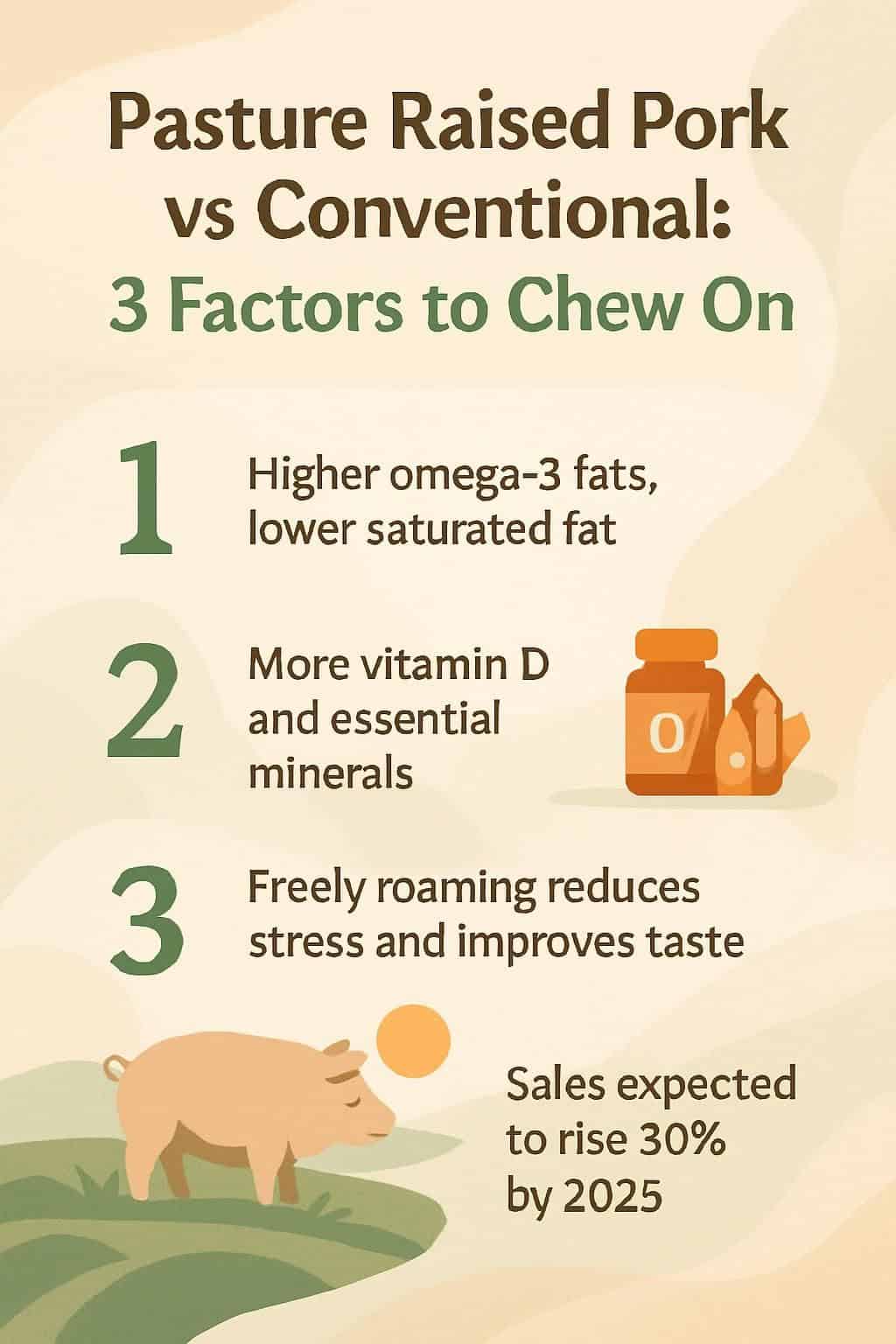
Plus, pigs living outdoors produce meat rich in essential vitamins like B6 and B12, along with minerals such as iron, zinc, and selenium. These key nutrients keep your whole body healthier and functioning at its best.
The nutritional benefits of pasture-raised food extend beyond taste to create a truly nutrient-dense eating experience.
Outdoor-raised pork also offers a better fatty acid profile. Since pasture pigs roam freely, grazing and munching on diverse plant foods, the fat makeup of their meat naturally changes.
You’ll find higher omega-3 fatty acids in pork from pasture-raised animals than from factory-farmed pigs—good fats that actively reduce inflammation throughout your body. And because pasture pigs don’t eat feed treated with synthetic pesticides or fertilizers—you get cleaner, healthier meat every time.
Fatty Acid Composition
Pasture-raised pork offers a healthier fat balance compared to regular pork. A study titled “Fatty Acid Comparisons of Grain and Forage-Fed Pork” found that outdoor-raised pigs produce meat richer in omega-3 fatty acids.
These beneficial fats support both heart health and brain function. I’ve even noticed this myself while cooking—the pasture-raised pork cuts had deeper color and firmness, likely from the healthier fat content.
Outdoor pigs graze on grasses and natural plants, giving their meat lower levels of unhealthy saturated fats. Their active lifestyle, along with varied eating habits, contributes to this healthier fat balance.
The type of fat you serve matters greatly for your family’s well-being. Pasture-raised pigs gain healthier fat content from their diverse, natural diets and daily activity. In contrast, pigs raised indoors on factory farms mainly eat grain and soybean mixtures, producing meat with a less beneficial fat makeup.
The nutritional differences only increase as pigs spend extra time outdoors eating assorted plants. Better animal welfare care directly reduces pigs’ stress levels, allowing their bodies to process and store fat in healthier ways.
Animal Welfare
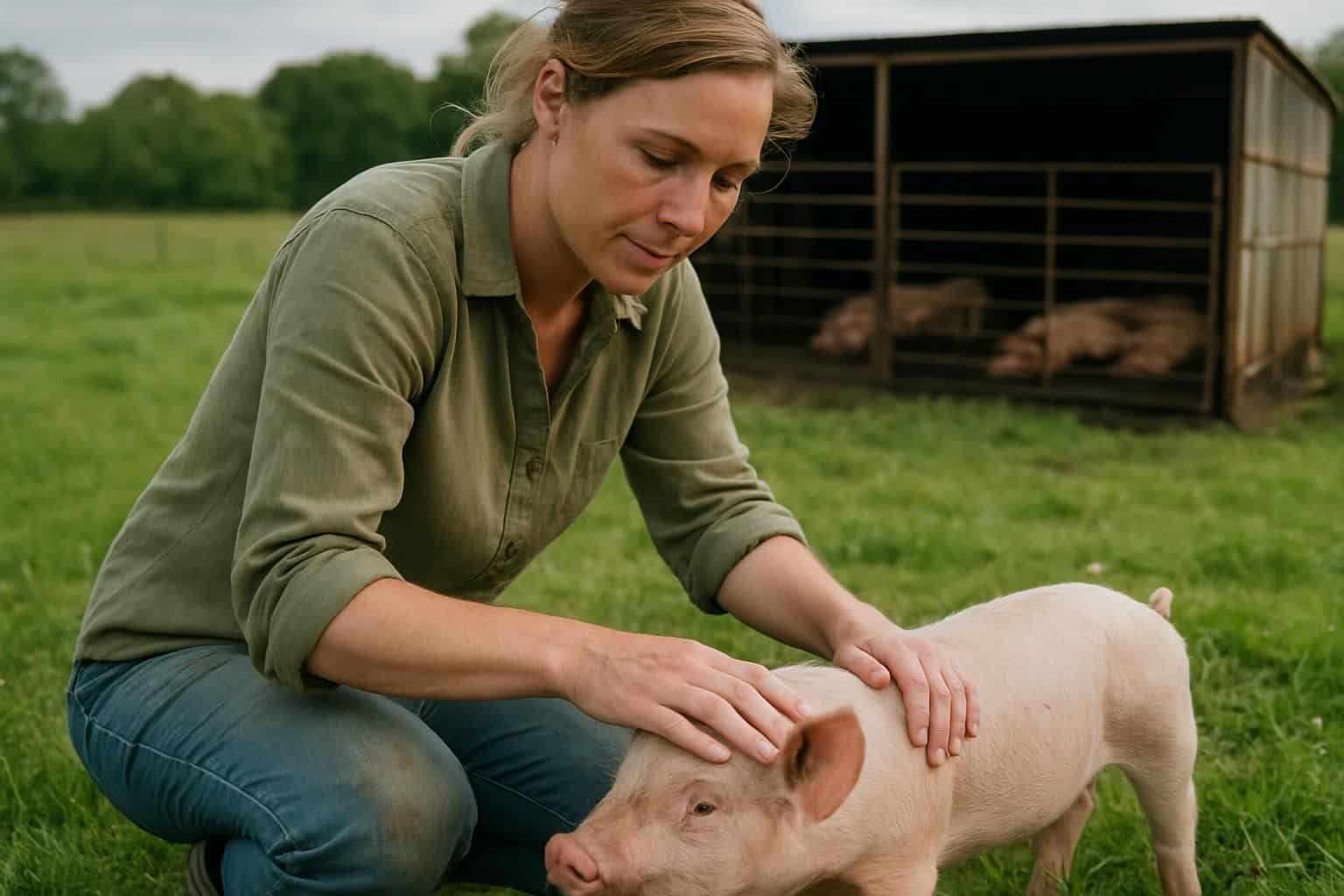
Animal welfare marks a stark contrast between pasture-raised and factory-farmed pigs. Pasture pigs roam freely with room to root and play, while conventional operations often keep sows in tight spaces that limit natural behaviors.
Living Conditions
Pasture-raised pigs lead active, free lives, unlike their factory-farmed counterparts. They roam outdoors, with plenty of shade and shelters to rest in, plus clean water nearby. Sunlight touches their skin each day, giving them opportunities for natural behaviors—like rooting around the soil and wallowing in mud.
With ample room to move, pigs build stronger muscles, producing meat that’s leaner and has healthier fat.
Factory farms, known as CAFOs, pack pigs into tight, crowded pens with barely enough room to turn. Waste builds up quickly in these cramped areas, putting the animals under intense stress and causing health problems.
Most surprising of all, pasture-raised farms don’t use gestation crates at all. These narrow metal cages trap pregnant sows on conventional farms, leaving them unable to even turn around for several months.
High stress levels harm the pigs’ overall health, lowering the nutritional quality of the meat they produce.
Stress Levels
Pigs raised on pasture enjoy much happier lives compared to those stuck in confinement. Last summer, at local pig farms, I saw this difference with my own eyes. On pasture, pigs roam freely, dig in the soil, and soak in the warmth of the sun.
These natural activities lower their stress and keep anxiety levels down, directly leading to more tender meat. Plus, pigs raised outdoors develop higher levels of omega-3 fatty acids, making their meat healthier for us.
Life is tougher for pigs raised indoors in tight, confined spaces. With little room to move around, stress builds up quickly, and animals become prone to illness. Many large factory farms respond by adding antibiotics to the pigs’ feed to control illness.
But sadly, this practice can lead to bacteria becoming resistant to these drugs, which puts the entire food system at risk. Allowing pigs to live naturally through rotational grazing keeps them healthier, without depending on antibiotics.
This approach boosts both animal welfare and our local economy.
Environmental Impact
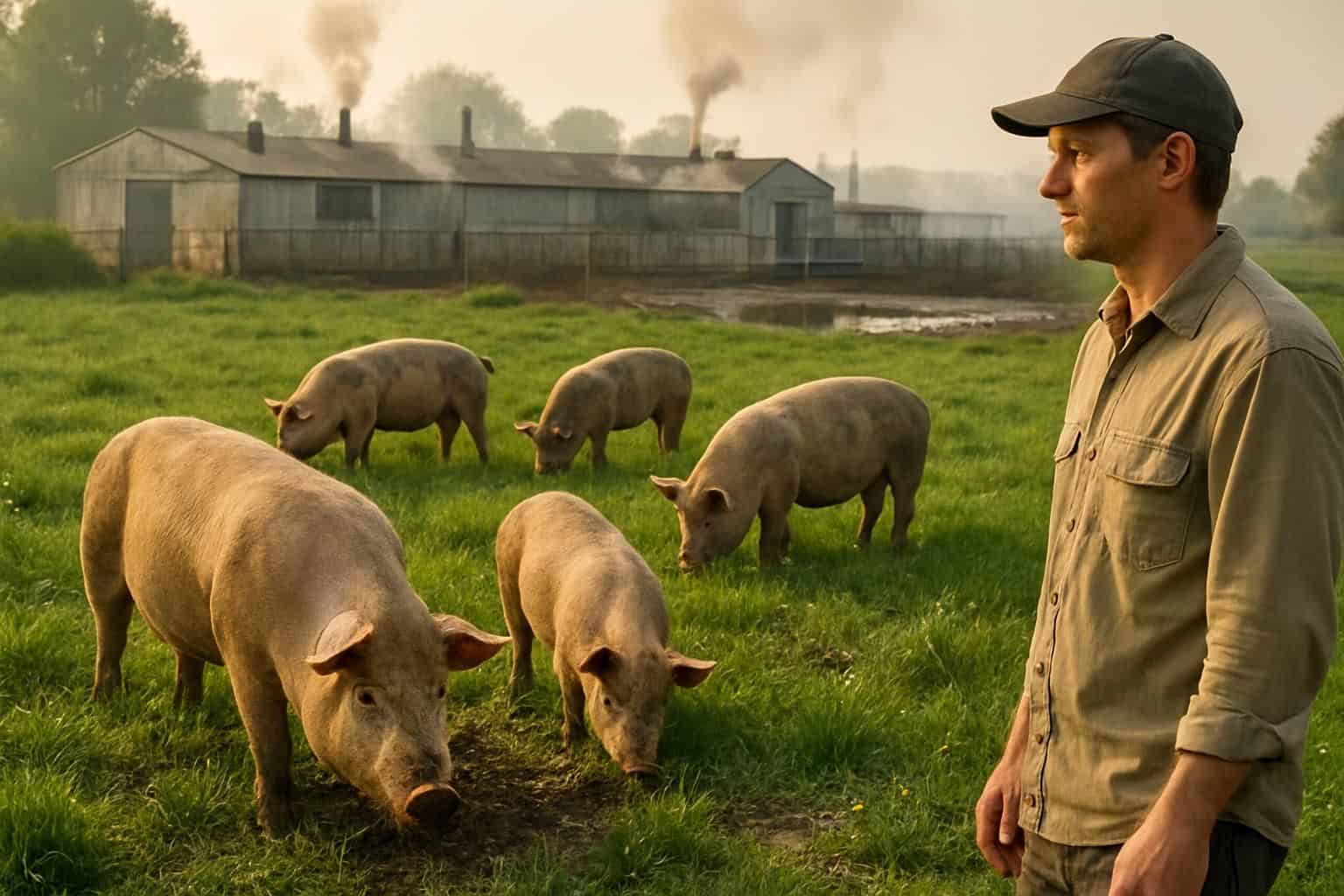
Raising pork on pasture creates far less environmental harm than factory-style farming methods. With pigs moving freely outdoors, manure naturally spreads across the soil—improving fertility and reducing demand for artificial fertilizers.
This natural way of handling waste sharply contrasts conventional pig operations, which often struggle to handle enormous amounts of manure. Large indoor farms can resemble sewage treatment plants, struggling to contain animal waste due to high concentrations in small areas.
By contrast, pastured pig manure enriches soil health instead of causing contamination.
Pasture-based operations build food systems that last. Farms with pigs grazing outdoors encourage diverse plants, nourishing both animals and land. Such farming techniques protect soil from erosion through smarter land care methods.
These pasture systems also need fewer resources, helping them handle changes caused by climate shifts. Addressing environmental issues today determines if meat production stays sustainable in the future.
Exploring these changes becomes even more important as 2025 approaches—with new challenges ahead and better farming solutions waiting.
How Will These Factors Evolve in 2025?
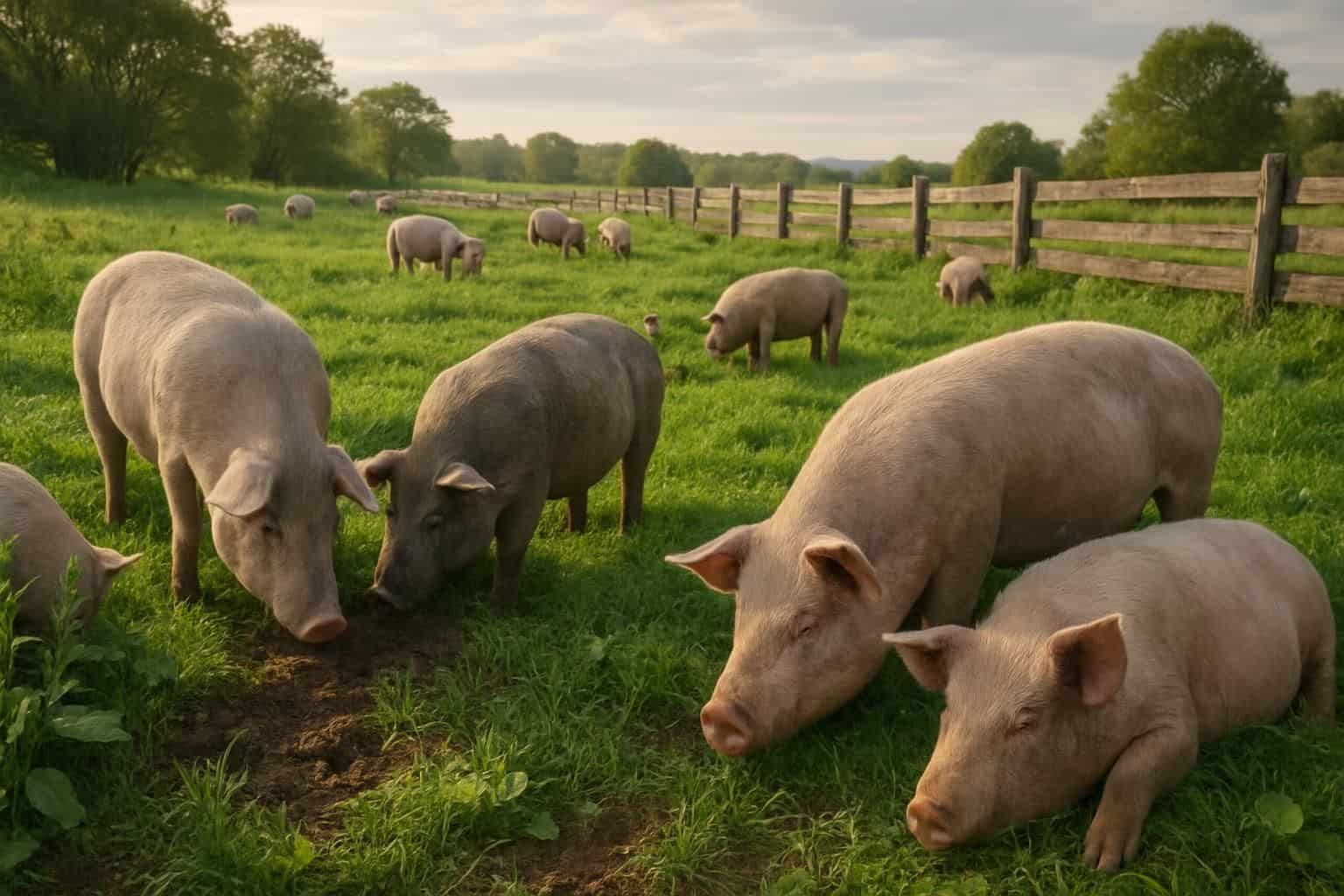
The pork farming industry is heading toward brighter, more sustainable practices. Experts expect pasture-raised pork operations to grow 30% by 2025, driven by consumer demand for antibiotic-free meat.
Farmers are adopting farming methods that regenerate soil health and prevent soil erosion. These methods naturally create fertilizers, shrinking pig farming’s environmental impact.
Many families now prefer healthier pork, with higher omega-3 fats and added essential vitamins, over traditional meat options.
Market trends show pasture-raised pork becoming more common at grocery stores and local farmers’ markets. Technology will soon become vital in monitoring animal welfare standards and environmental effects.
Small-scale farmers can use mobile apps to track pig health, cutting the need to depend on antibiotics. This tech-driven approach helps solve issues linked to drug-resistant bacteria—an ongoing concern related to antibiotic overuse.
Even finicky eaters can appreciate these healthier pork choices—you can explore these dinner ideas for picky eaters, which include tasty pasture-raised meat options.
People Also Ask
What makes pasture-raised pork different from conventional pork?
Pasture-raised pork comes from pigs raised outdoors, roaming freely and naturally grazing on plants. These hogs get plenty of exercise and feed on grasses, roots, and forage crops, unlike conventional pigs confined in tight spaces. Instead of living cramped in gestational crates, pasture-raised pigs grow in open areas and build natural strength and resilience.
Is pasture-raised pork more nutritious than conventional pork?
Yes! Pork from pasture-raised pigs includes more key vitamins and minerals, such as vitamin B6. The meat has healthier fats, too, offering beneficial omega-3s and other essential fatty acids from a natural diet. Animals eating naturally-grown foods produce meat that’s great for your body.
Why does pasture-raised pork cost more?
Pasture-raised pork tends to cost a bit more because raising pigs naturally takes more time, effort, and land than conventional methods. Small farms can’t match the huge production levels of large factory farms. Plus, sustainably raised pigs don’t rely on cheap synthetic fertilizers, pushing real costs higher—and prices reflect those differences.
Does conventional pork contain antibiotics?
Most pork from conventional farms comes from animals that regularly get antibiotics to speed growth and prevent illness. This frequent antibiotic use contributes to antibiotic-resistant bacteria entering the food chain. Pasture-raised pork usually comes from animals raised without antibiotics, keeping harmful bacteria away from our plates.
How does raising pork affect the environment?
Conventional pork farming creates serious environmental problems from huge amounts of waste, excess energy use, and intensive water consumption. Raising pigs on pasture uses regenerative farming practices instead, improving soil health and fertility. This style of farming significantly reduces negative effects on the environment.
Where can I buy pasture-raised pork?
You can buy pasture-raised pork at farmers’ markets, specialized butcher shops, and in organic sections at certain grocery stores. Many organic farms that offer grass-fed beef also sell pork raised outdoors. Some local farms even allow you to buy pork directly from them through convenient subscription programs.
